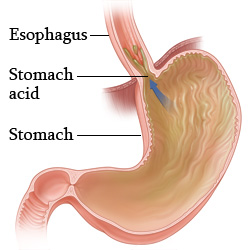
Overview
Gastroesophageal reflux is a backflow (reflux or regurgitation) of food and stomach acid into the esophagus. This is the tube that connects the throat to the stomach. When reflux irritates the lining of the esophagus and causes burning pain, difficulty eating, weight loss, or other problems, it is called gastroesophageal reflux disease (GERD).
Most babies have reflux. Babies with reflux may spit up. And some healthy babies may spit up frequently. Babies who have GERD may cry, vomit, and act fussy. Reflux usually goes away by the end of a baby's first year.
Older children can have symptoms that are a lot like the ones adults get. They can have heartburn or regurgitation.
Sometimes GERD causes breathing problems and other problems like a hoarse voice.
Follow-up care is a key part of your child's treatment and safety. Be sure to make and go to all appointments, and call your doctor if your child is having problems. It's also a good idea to know your child's test results and keep a list of the medicines your child takes.
How can you care for your child at home?
Infants
- Burp your baby several times during a feeding.
- Hold your baby upright for 30 minutes after a feeding.
Older children
- If your child is older than 12 months, raise the head of their bed a little bit. To do this, put blocks under the frame. Or you can put a foam wedge under the head of the mattress. Using extra pillows does not work.
- Change your child's eating habits:
- Try feeding your child smaller meals, more often.
- Avoid foods that make your child's symptoms worse. These may include chocolate, mint, alcohol, pepper, spicy foods, high-fat foods, or drinks with caffeine in them, such as tea, coffee, colas, or energy drinks. If your child's symptoms are worse after eating a certain food, your child may want to stop eating it to see if their symptoms get better.
- Try to feed your child at least 2 to 3 hours before bedtime. This helps lower the amount of acid in the stomach when your child lies down. Snacking close to bedtime can make their symptoms worse.
- Be safe with medicines. Have your child take medicines exactly as prescribed. Call your doctor if you think your child is having a problem with a medicine.
- Talk to your doctor if you want to try over-the-counter medicines. Some are not used in younger children, and some have aspirin in them. Do not give aspirin to anyone younger than 20. It has been linked to Reye syndrome, a serious illness.
When should you call for help?
Call 911 anytime you think your child may need emergency care. For example, call if:
- Your child passes out (loses consciousness).
Call your doctor now or seek immediate medical care if:
- Your child's vomit is very forceful or yellow-green in color or bloody.
- Your child has new or worse belly pain.
- Your child's stools are black and tarlike or have streaks of blood.
- Your child has signs of needing more fluids. These signs include sunken eyes with few tears, a dry mouth with little or no spit, and little or no urine for 6 hours.
Watch closely for changes in your child's health, and be sure to contact your doctor if:
- Your child does not get better as expected.
Where can you learn more?
Go to http://www.healthwise.net/patientEd
Enter L132 in the search box to learn more about "Gastroesophageal Reflux in Children: Care Instructions".
Current as of: October 19, 2024
Author: Ignite Healthwise, LLC Staff
Clinical Review Board
All Healthwise education is reviewed by a team that includes physicians, nurses, advanced practitioners, registered dieticians, and other healthcare professionals.

